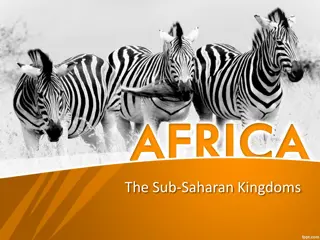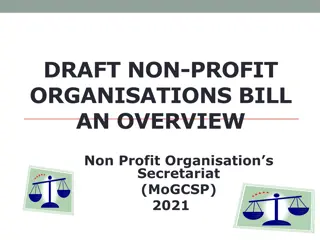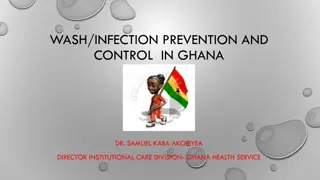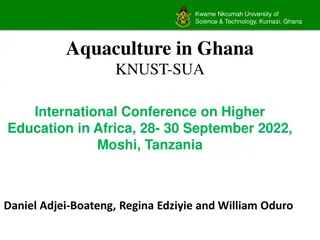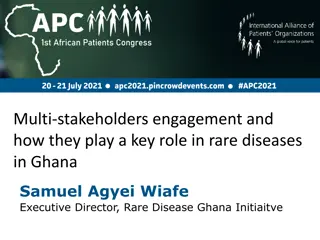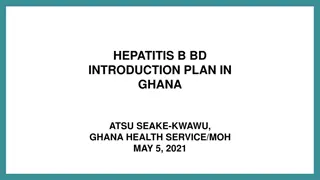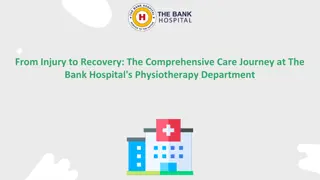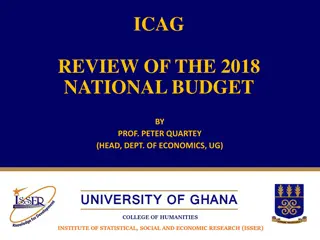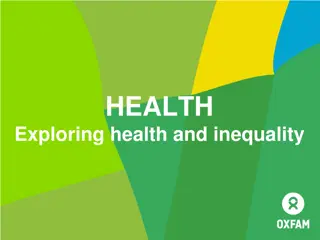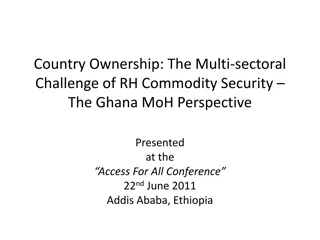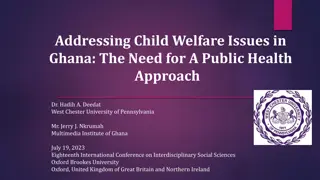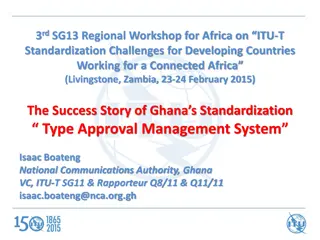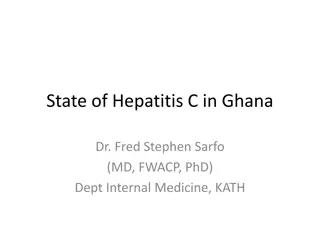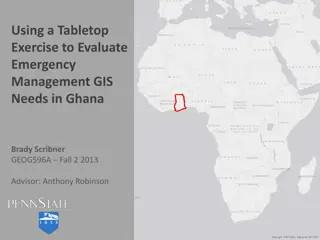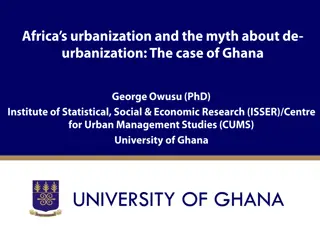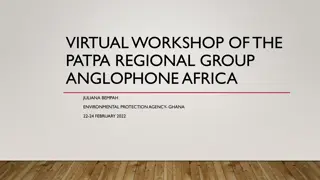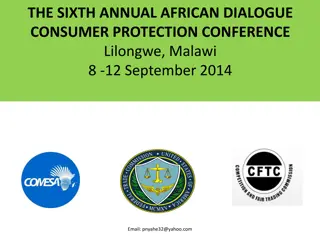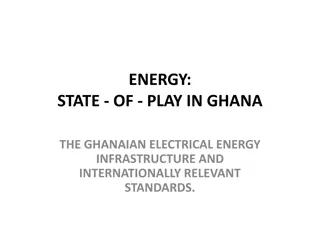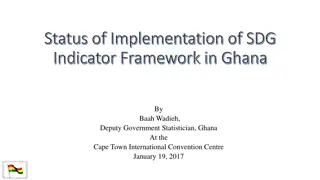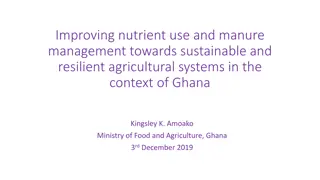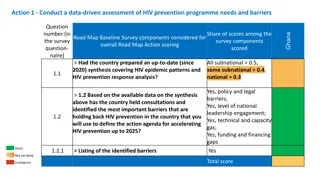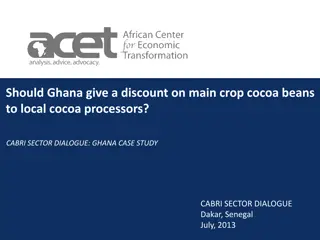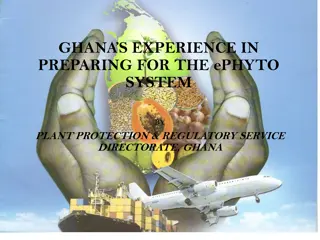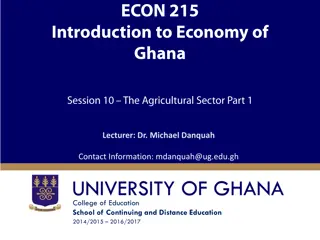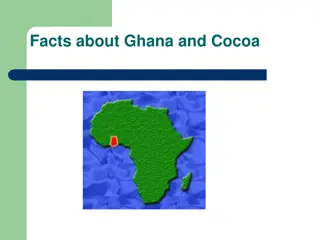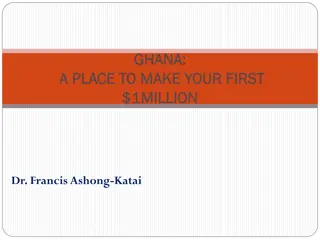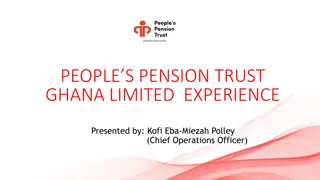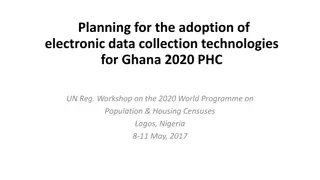Principles of the Ghana Civil Service Code of Conduct
The Code of Conduct for the Ghana Civil Service, outlined by Elizabeth Obeng-Yeboah, emphasizes principles such as abiding by the constitution and laws with dignity, integrity, and professionalism. It sets standards for conduct, avoiding conflicts of interest, maintaining political neutrality, and u
1 views • 34 slides
Understanding Civil Society: Concepts, Challenges, and Implications
Explore the dynamics of civil society, from its dense network of groups to its role in democracy. Delve into the typology of Civil Society Organizations, the connection between civil society and democracy, and the unique landscape of civil society in Norway. Engage in thought-provoking discussions o
0 views • 9 slides
Sub-Saharan Kingdoms of Ghana and Mali: Rise and Fall
The Sub-Saharan Kingdoms of Ghana and Mali were powerful empires in Western Africa, known for their wealth in gold and salt trade. Ghana emerged in 500 A.D. as the first great traders in West Africa, with strong rulers and a well-trained army. The empire of Ghana controlled all gold trade and had a
2 views • 17 slides
Overview of Non-Profit Organisations Bill and Historical Background in Ghana
The article provides an in-depth overview of the Non-Profit Organisations (NPO) Bill in Ghana, highlighting its importance as a tool for development. It covers the challenges faced in the past regarding NPO regulation and outlines the historical background leading to the creation of the NPO Secretar
0 views • 27 slides
Enhancing Infection Prevention and Control in Ghana's Health Facilities
The Ghana Health Service, under the leadership of Dr. Samuel Kaba Akoriyea, has implemented initiatives to strengthen infection prevention and control (IPC) in healthcare facilities. This includes training programs for health staff, development of national technical guidelines, and establishment of
1 views • 4 slides
Evolution of Fish Farming in Ghana: A Historical Overview
Fish farming in Ghana has a rich history dating back to the 1950s. The industry has evolved significantly over the decades, from traditional methods to modern practices like low-input commercial farming. Despite challenges like lack of technical support, the sector has shown growth with a focus on k
9 views • 22 slides
Stakeholder Engagement in Rare Diseases: Key Role in Ghana
Rare diseases in Ghana present significant challenges such as lack of awareness, insufficient data, delayed diagnosis, and limited treatment options. To address these issues, collaborative efforts involving multiple stakeholders are essential. Actions are needed to enhance health education, improve
0 views • 9 slides
Hepatitis B BD Introduction Plan in Ghana
In Ghana, the introduction plan for Hepatitis B BD involves evaluating disease burden, estimating seroprevalence among pregnant women, obtaining necessary approvals, presenting evidence to NITAG, and seeking support for introduction. A policy for screening and prevention is in place, aiming to addre
1 views • 10 slides
Challenges and Prospects of Implementing New National Teacher Education Curriculum at University of Education, Winneba, Ghana
This presentation by Hans Kweku Anderson (PhD) explores the background, literature review, problem statement, research questions, methodology, results discussion, and recommendations regarding the implementation of the new national teacher education curriculum at the University of Education, Winneba
0 views • 20 slides
Challenges and Progress in 1920s American Civil Rights Movement
The 1920s in America saw significant changes in civil rights, women's movement, and prohibition. Civil rights encompass personal freedoms guaranteed by the U.S. Constitution, including freedom of speech, voting rights, and protection from discrimination. Violations of civil rights have occurred thro
1 views • 42 slides
From Injury to Recovery: The Comprehensive Care Journey at The Bank Hospital
Physiotherapy, Best Physio Hospital Ghana, Best Physiotherapy Hospital Accra, Best Physiotherapy Hospital Ghana, Best Physiotherapy Services Ghana
1 views • 7 slides
Understanding Ghana's External Sector: Strategies and Outlook
This session led by Dr. Emmanuel A. Codjoe and Dr. Michael Danquah delves into Ghana's external sector, discussing its importance, trade direction, and strategies for development. Students will gain insights into Ghana's trade dynamics, balance of payments, and future outlook. The session covers key
3 views • 24 slides
Analysis of Ghana's 2018 National Budget by Prof. Peter Quartey
The review by Prof. Peter Quartey from the University of Ghana delves into the key aspects of Ghana's 2018 budget, focusing on the transition from stabilization to growth. The budget emphasizes job creation, livelihood improvements, and equal opportunities through investments in agriculture, infrast
0 views • 41 slides
Exploring Health and Inequality in Ghana
This exploration delves into health and inequality issues, focusing on maternal health in Ghana. It discusses maternal health goals, a comparison between Ghana and the UK, and profiles of mothers from both the southern and northern regions of Ghana. The content emphasizes the importance of free heal
0 views • 13 slides
Enhancing RH Commodity Security: Ghana MoH Perspective
Ghana's Ministry of Health (MoH) emphasizes country ownership in addressing the multi-sectoral challenges of reproductive health (RH) commodity security. The MoH highlights the importance of stakeholder involvement in national planning, coordination mechanisms, and strategic frameworks to improve ma
1 views • 18 slides
Addressing Child Welfare Issues in Ghana: A Public Health Approach
Child abuse and neglect are prevalent in Ghana, necessitating a shift towards a primary prevention approach in child protection practices. Researchers aim to investigate the utilization of such methods and establish strategies for addressing child maltreatment effectively. The study emphasizes the n
0 views • 22 slides
Enhancing Standardization with Ghana's Type Approval Management System
Exploring the success story of Ghana's Standardization Type Approval Management System at the 3rd SG13 Regional Workshop for Africa. Isaac Boateng from the National Communications Authority shared insights on the technical and regulatory requirements, challenges, and the importance of Type Approval
0 views • 18 slides
The Plight of Child Beggars in Ghana: Addressing Migration and Neglect
Child migration and neglect leading to a proliferation of child beggary in Ghana is a critical issue impacting the health and wellbeing of young migrants. This presentation highlights the background, triggers, dystopia faced by migrant children, health cases, and findings related to child beggary in
0 views • 17 slides
Overview of Hepatitis C Epidemiology in Ghana by Dr. Fred Stephen Sarfo
Dr. Fred Stephen Sarfo's research on Hepatitis C in Ghana reveals a notable sero-prevalence of the virus across various populations such as blood donors, prisons inmates, and more. The studies show varying HCV antibody frequencies, highlighting the need for continued surveillance and targeted interv
0 views • 25 slides
Enhancing Emergency GIS Capacity in Ghana through Tabletop Exercises
This study explores the use of tabletop exercises to evaluate and enhance the emergency management GIS needs in Ghana, focusing on the National Disaster Management Organization (NADMO). The research identifies critical needs for GIS capacity building, stakeholder involvement, personnel training, and
0 views • 21 slides
Urbanization Trends in Ghana: Demographic Shift and Development Challenges
Ghana has experienced significant urbanization, with about 57% of the population urbanized in 2019. However, urban growth rates vary across Sub-Saharan Africa, with some countries showing counter-urbanization trends. In Ghana, urbanization has led to the concentration of population in major cities,
0 views • 17 slides
Sustainable Adaptation Strategies in Ghana: Insights from the PATPA Regional Workshop
Explore key highlights from the virtual workshop organized by the PATPA Regional Group in Anglophone Africa, focusing on adaptation reporting in Ghana, including NDCs, NAPs, and NATCOMs. Learn about the significance of the Standalone ADCOM in enhancing institutional structures and governance arrange
0 views • 4 slides
Improving Consumer Protection in Ghana: Insights from the Sixth Annual African Dialogue Consumer Protection Conference
The Sixth Annual African Dialogue Consumer Protection Conference held in Lilongwe, Malawi in September 2014 shed light on the challenges faced by Ghana's consumer protection policies. Irene Aborchie-Nyahe, a legal consultant, highlighted the gaps in Ghana's legislative framework, lack of effective i
0 views • 14 slides
Challenges and Threats in E-Commerce: Ghana's Perspective
E-commerce in Ghana faces significant barriers including technical, financial, logistical, human, and policy/regulatory factors. Cyber threats are rampant, with Ghana being vulnerable to internet fraud and cyber-crime. The country struggles with a lack of infrastructure, financial investment, litera
1 views • 11 slides
Evolution of Electrical Infrastructure in Ghana
The historical development of Ghana's electrical energy infrastructure, initiated by the British government before Ghana's independence, led to the establishment of voltage standards and systems primarily based on fossil fuel generators. The Volta River Hydroelectric Project played a pivotal role in
0 views • 17 slides
Implementation of SDG Indicator Framework in Ghana
Presentation by Baah Wadieh, Deputy Government Statistician of Ghana, at the Cape Town International Convention Centre on January 19, 2017, discussing the legal framework, long-term national development plan, and activities to increase data production in Ghana. The presentation highlights the existi
0 views • 17 slides
Transforming Ghana's Senior High School Education System for the 21st Century
Ghana's education sector is undergoing significant reforms to equip young people with the skills and competencies needed for lifelong learning and employability. The aim is to create an inclusive, flexible system that reflects stakeholder voices, integrates STEM education, and emphasizes 21st-centur
0 views • 17 slides
Enhancing Nutrient Use and Manure Management for Sustainable Agriculture in Ghana
This study explores strategies to improve nutrient utilization and manure management in Ghana's agricultural systems. It discusses the sources of soil nutrients, reasons for low fertilizer use in Africa, ambitious targets set by the AU, and the impact of fertilizer subsidy programs in Ghana. Data on
0 views • 12 slides
Assessment of HIV Prevention Programme Needs and Barriers in Ghana
Conduct a data-driven assessment of HIV prevention programme needs and barriers in Ghana based on the Ghana Road Map Baseline Survey components. Evaluate the country's preparedness in addressing HIV epidemic patterns and prevention response analysis. Identify key barriers hindering HIV prevention ef
0 views • 11 slides
Should Ghana Provide Discounts on Cocoa Beans for Local Processors? A Case Study
Ghana's cocoa sector plays a significant role in the country's economy, yet less than 25% of cocoa beans are processed locally, limiting its market share. This case study explores the impact of local processing on Ghana's cocoa industry and discusses the dilemma of value addition. The question of wh
0 views • 14 slides
Corporate Failures in Ghana: Roles of Auditors and Accountants
This study conducted at Kwame Nkrumah University of Science & Technology, Kumasi, Ghana, explores the causes of corporate crises in Ghana and the roles played by auditors and accountants. The research aims to identify common business areas contributing to corporate crises and internal factors leadin
0 views • 53 slides
Ghana's Experience in Preparing for the ePhyto System by Plant Protection & Regulatory Service Directorate, Ghana
The presentation outlines Ghana's preparedness for the ePhyto system, including setting up the ePhyto, challenges, expectations for international trade, and conclusion. Ghana's National Plant Protection Organizations play a crucial role in ensuring phytosanitary certificates meet import requirements
0 views • 15 slides
Comparing Indigenous Laterite and Bauxite with Imported Activated Alumina for Fluoride Adsorption in Rural Northern Ghana
This study compares the effectiveness of indigenous laterite and bauxite with imported activated alumina for use in small-scale fluoride adsorption filters in rural Northern Ghana. It discusses the study area, the issue of fluorosis, and potential solutions using different sorbents. Physical and che
0 views • 12 slides
Community-Based Health Planning and Services (CHPS) in Ghana: A Key Strategy for Healthcare Expansion
The Community-Based Health Planning and Services (CHPS) arrangement is crucial for enhancing healthcare provision in Ghana. This strategy involves mobilizing community leadership, resources, and frontline health staff to deliver essential services based on the principles of primary healthcare. Since
0 views • 17 slides
Understanding Ghana's Agricultural Sector: Key Features and Contributions
Explore the structure and nature of Ghana's agricultural sector through topics like cocoa production, crops, livestock, forestry, and fisheries. Discover the key roles agriculture plays in Ghana's economy, and the performance of its sub-sectors. Gain insights into the different types of agricultural
0 views • 22 slides
Fascinating Facts About Ghana and Cocoa
Ghana, a West African country, is known for its rich history, vibrant culture, and significant contributions to the global cocoa industry. From being led to independence by Dr. Kwame Nkrumah to being named after the ancient Sudanic empire of Ghana, the country has a compelling past. Today, Ghana's c
0 views • 25 slides
Ghana 2040: A Promising Future for Economic Growth and Investment Opportunities
Ghana is positioned to become a significant player in the West African economy by 2040, with a fast-growing middle-income status and a projected population of over 50 million. The country's solid economic foundation, diverse export sectors, and strategic partnerships within the ECOWAS region make it
0 views • 17 slides
Enhancing Social Security Coverage in Ghana: Peoples Pension Trust Experience
Ghana has historically focused on social security for formal workers, leaving the informal sector underserved. Efforts since the early 2000s to bridge this gap have faced challenges. Peoples Pension Trust has been a key player in trying to extend coverage to the informal sector. Various pension sche
0 views • 23 slides
Avoiding the Resource Curse: Ghana's Path to Prosperity amidst Oil Discovery
Ghana's significant oil discovery presents a transformative economic opportunity. To prevent the resource curse that has plagued other oil-rich nations like Nigeria, Ghana must navigate carefully. With lessons learned from Nigeria's experience, Ghana aims to harness its oil wealth for sustainable gr
0 views • 30 slides
Adoption of Electronic Data Collection Technologies for Ghana's Population Census
The adoption of electronic data collection technologies in Ghana for the 2020 Population and Housing Census has brought significant improvements over traditional methods. This transition process aims to streamline data collection, analysis, and dissemination, reducing time lags and improving the qua
0 views • 13 slides


